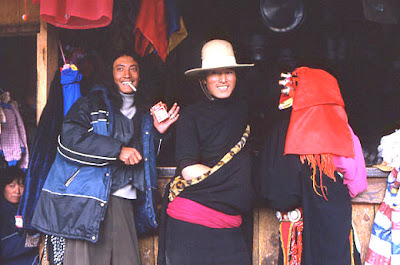 Burmese villagers May 11 [reuters via Agam's Gecko]
Burmese villagers May 11 [reuters via Agam's Gecko]from "Thinking of Burma" by Jamyang Norbu:
"We must also spare a moment to contemplate the plight of Aung San Suu Kyi, the most fearless and committed fighter for freedom and democracy we have right now in the world. Tibetans, especially those in Chinese prisons for the cause of independence, have a genuine revolutionary bond with her. She remains a prisoner not just out of the viciousness of the Burmese military government, but because Beijing does not want her released.
"In 2000 a worldwide campaign for a consumer boycott and shareholder pressure forced companies like ARCO, Eddie Bauer, Liz Claiborne, Macy’s, Reebok and Petro Canada to withdraw from Burma. In January 2001, the Burmese military junta finally agreed to enter into negotiations with Aung San Suu Kyi. On 6 May 2002, following secret confidence-building negotiations led by the United Nations, the government released her; a government spokesman said that she was free to move “because we are confident that we can trust each other”. Aung San Suu Kyi proclaimed “a new dawn for the country”.
"However on 30 May 2003, a government-sponsored mob attacked her and her supporters in the northern village of Depayin, murdering and wounding many of her supporters. Aung San Suu Kyi fled the scene with the help of her driver, but was later arrested. The government imprisoned her at Insein Prison in Yangon.
"What happened? China realized that the economic sanctions and pressure from the West was forcing the Burmese regime to release Suu Kyi, and perhaps even allow some possible measure of democratization in the country. So Beijing stepped in with massive investments, trade and arms supplies to the regime that effectively cancelled out the effect of the West’s sanctions. China has since been effectively blocking all discussion and action against the junta in the United Nations Security Council, and vetoing all resolutions calling for the release of Aung San Suu Kyi and other political prisoners. It has also effectively managed to water down discussions and block resolutions in other international forums, especially those condemning the junta’s murderous crackdown on monks and democracy activists in the wake of last year’s anti-government demonstrations.
"Even a partially democratic Burma threatens China’s very profitable exploitation of Burma’s oil and gas resources. It also puts at risk China’s naval access to the Indian Ocean, which is a vital part of its “string of pearls” strategy to project Chinese military power in Asia and the Pacific. There is also the concern among Chinese strategic thinkers that a popular or democratic upheaval in Burma could have a ripple effect in Tibet, East Turkistan or even North Korea, and threaten the Chinese Communist Empire and its surrogate dictators in some Asian nations – which are fast becoming China’s new economic colonies.
"Hence Aung San Suu Kyi is as much a prisoner and a victim of Beijing’s tyranny and power schemes as any one of the thousands of Tibetans now incarcerated throughout Tibet."



